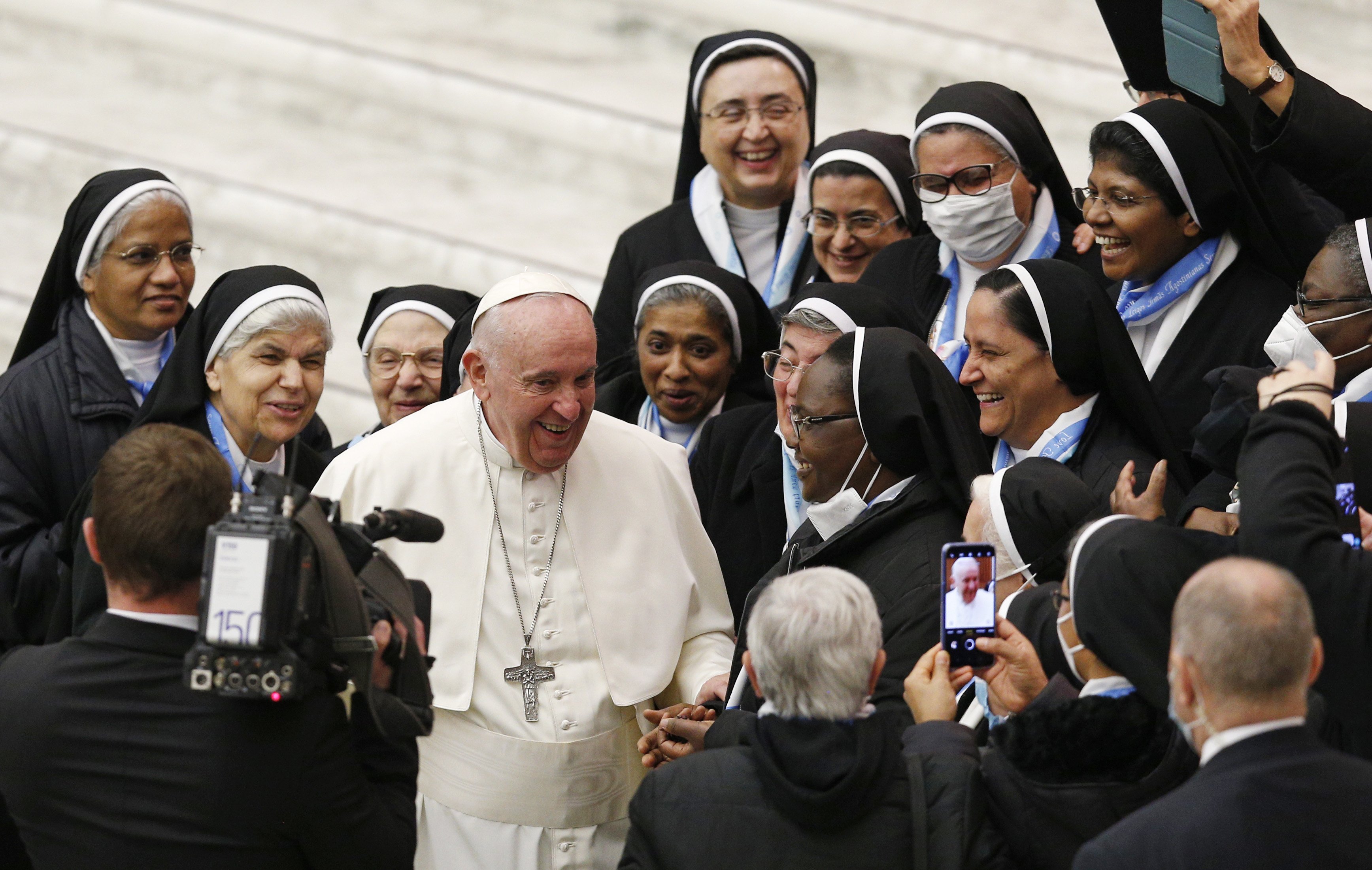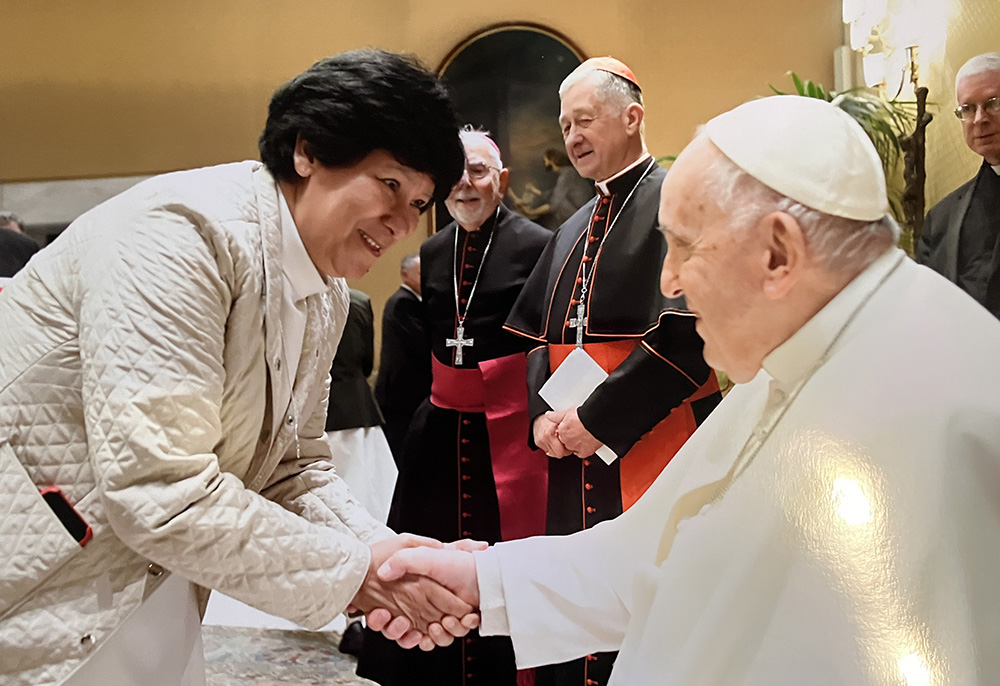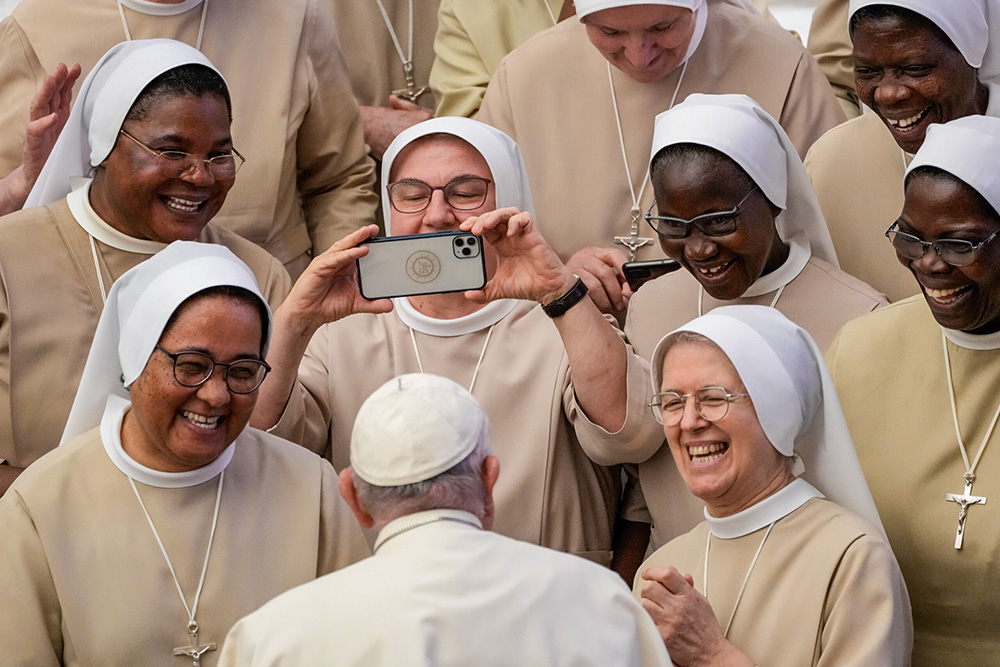
Pope Francis greets nuns during his general audience in the Paul VI hall at the Vatican on Jan. 5. Francis has said women religious play an essential role in the synodal process through their prayers and participation and by listening to people not usually part of such church activities. (CNS/Paul Haring)
Pope Francis, who elevated the status of women, and especially women religious, within the Catholic Church more than any pontiff in history, died early April 21. He was 88.
Throughout his papacy, which began on March 13, 2013, after the resignation of his predecessor Benedict XVI, Francis decried the clericalism built into the church hierarchy, which for centuries reserved the vast majority of power for priests and bishops. However, for roles within the church bureaucracy that could be filled by laity, Francis often made a point of breaking with tradition and appointing women religious.
"Francis most modeled what the Jesus of the Gospels would do, as I understand the Gospels," said Beth Blissman, the Loretto Community's representative at the United Nations.
In 2022, Francis overhauled the Vatican's constitution to allow women and laity to run offices of the Roman Curia. On Jan. 6, 2025, Francis appointed Consolata Missionary Sr. Simona Brambilla prefect of the Dicastery for Institutes of Consecrated Life and Societies of Apostolic Life, the Vatican office working with religious orders and their members. For the first time in the Catholic Church, women religious would be overseen by a woman.
The Leadership Conference of Women Religious said Francis lived out the Gospel.
"He embodied the values that he held throughout his priesthood: that people who are hurting and in need must be given our highest priority, that leaders must spend time on the margins listening to those whose perspectives may differ from their own, and that we must be fearless in speaking out in the face of all that goes against gospel teachings," the conference said in a statement. "He generously carried in his heart and prayer every bit of the suffering to which he was exposed. He gave to the world a public face of a church that was welcoming and inclusive – a church that strove to be a true 'field hospital.'"
Sr. Mary Barron, president of the International Union of Superiors General and a member of the Sisters of Our Lady of the Apostles, issued a statement on behalf of the organization, calling Francis’ death a loss "for the entire world."
"We are profoundly grateful for his spiritual guidance, which has strengthened all religious communities worldwide in their mission to embody Christ’s teachings," Barron wrote. "His voice for peace, justice, compassion, and ecological care will continue to echo in our hearts and actions."
Brambilla's appointment followed a string of appointments, including in 2021, when Francis appointed Xavierian Sr. Nathalie Becquart undersecretary of the Vatican's Synod of Bishops office. While she would share the role of the office's No. 2 official with a bishop, it was groundbreaking that anyone other than a bishop was named to the post, let alone a woman.
The office, created in 1965, organizes synods in Rome, and there was talk that Becquart might even be able to vote at synods, which would be a major first.

Sr. María Elena Méndez Ochoa of the Guadalupan Missionaries of the Holy Spirit greets Pope Francis in Rome in a private audience for a group of Latin American sisters and a Catholic Extension team on April 26. (Courtesy of María Elena Méndez Ochoa from the printed photo taken by the Vatican)
In 2019, Francis stunned theologians and women religious alike when he named six leaders of international religious orders and one woman who heads an institute of consecrated laywomen as full members of the Congregation for Institutes of Consecrated Life and Societies of Apostolic Life, where they took on a role similar to board members, responsible for considering and voting on policies that directly affect sisters, a first for that Vatican department.
In 2021, he appointed Franciscan Sister of the Eucharist Raffaella Petrini as the new secretary general of the Governorate of Vatican City State, making her the highest-ranking woman in the Vatican. By 2022, the Vatican yearbook listed over a dozen sisters working as officials inside Vatican departments and even more as members and consultors to various dicasteries.
In 2023, Francis allowed about 50 women to be full members with voting rights at the Synod on Synodality. Previously, women religious had been allowed into synods as observers or experts but not allowed to vote. This time, participants — including Francis — sat at round tables and had equal opportunities to speak and participate.
Francis was the first pontiff from Latin America, becoming an inspiration for the 425 million Catholics there. The organization for men and women religious in Latin America, the Confederation of Latin American Religious, called Francis their "brother" in a Facebook post.
"Religious life across the continent, in union with the Church, gives thanks for the kind and prophetic presence of Pope Francis, who helped us focus on Jesus and led us toward a synodal and missionary Church," the post said. "Thank you, Francis, for always being a brother to us!"
Francis reversed church policy and practice in many ways: During the 2023 synod, he met for nearly an hour with Loretto Sr. Jeannine Gramick, co-founder of the Maryland-based LGBTQ Catholic advocacy group New Ways Ministry. Gramick had been under investigation and rebuke by American bishops and Vatican officials for decades for her ministry to LGBTQ Catholics. In a letter before the meeting, Francis wrote, "I know how much she has suffered," and that "She is a valiant woman who makes her decisions in prayer."
"The meeting was very emotional for me," Gramick said at the time. "From the day he was elected, I have loved and admired Pope Francis because of his humility, his love for the poor and for those shunned by society. He is the human face of Jesus in our era. Pope Francis looks into your heart and his eyes say that God loves you."
In 2015, when the United States was reaching new lows in its divisions over immigrants at the southern border, Francis made it clear where he stood, singling out Missionaries of Jesus Sr. Norma Pimentel in front of 400 people during a video conference for national television, asking her to come forward and saying "I love you," for her tireless efforts ministering to immigrants in McAllen, Texas. That papal shout-out was followed by Pimentel sitting in the VIP section at the White House as President Barack Obama welcomed Francis, a trip to New York to watch the pope speak to the United Nations, and a personal meeting with him at the diplomatic residence of the Holy See.
Francis didn't only promote and honor women religious, he motivated them: In 2015, he released his encyclical Laudato Si', a 184-page treatise on the environment, showing the connections between everything from technology to spirituality, carbon emissions to copper mining and environmental justice to materialism.
Francis' clear language in the encyclical left no room for doubt: The world is in peril, human beings are the cause, and we can also be the solution, an idea women religious took to heart. Many women religious saw the encyclical as validation of the environmental work they had been doing for decades, and soon, congregation after congregation of sisters were implementing Laudato Si' Action Platforms, laying out how they would be part of the solution to the climate crisis instead of being part of the problem.
Laudato Si' "was one of the first things that Pope Francis did that inspired me," said Adrian Dominican Sr. Durstyne Farnan, who represents the Dominican Leadership Conference at the United Nations.
She said the pope's continued commitment to Mother Earth and the planet throughout his papacy was a constant inspiration and a milestone for Catholics and non-Catholics concerned about caring for the Earth.
"I am terribly grateful for him and his vision," Farnan said.

Pope Francis meets a group of nuns during his weekly general audience in the Pope Paul VI Hall at the Vatican on Aug. 30, 2023. (AP/Andrew Medichini)
By 2022, congregations of women religious in the United States were already confronting their complicity in Native American boarding schools, a 150-year effort by the federal government to wipe out Native culture. There were more than 400 government-funded boarding schools across the country from 1819 to the 1970s; 74 of those schools were run or staffed by Catholic women religious from 53 congregations. Their efforts followed decades of similar work by congregations in Canada.
Sisters' endeavors to accept responsibility and create a space where healing can begin was endorsed by Francis in July 2022 when he traveled to Canada to apologize for the Catholic Church's role in the schools, which he called "catastrophic" and a "disastrous error."
"I humbly beg forgiveness for the evil committed by so many Christians against the Indigenous peoples," Francis said. He had apologized to a delegation of Indigenous leaders who had traveled to Rome the year before, but said he also needed to go and apologize in person.
Francis also broke with the past when meeting with International Union of Superiors General plenary attendees, holding question-and-answer sessions with them and sometimes forgoing his prepared remarks entirely in favor of the dialogue.
In 2016, one of the questions was about the possibility of women deacons in the church, and Francis responded by authorizing a commission to study the history of the practice. The move was hailed but the commission later disbanded without making its report public.
That day, Francis warned sisters to be in service — but not servitude.
"When your Superiors are asked for something that is more servitude than service, have the courage to say 'no'. This is a rather helpful point, because when a consecrated woman is asked to perform a work of servitude, the life and dignity of that woman are demeaned," Francis said. "Her vocation is service: service to the Church. But not servitude!"
He gave to the world a public face of a church that was welcoming and inclusive – a church that strove to be a true 'field hospital.'
And though major personnel changes in the Vatican had already taken place by the time Francis' pontificate began in 2013, both the controversial Apostolic Visitation of women religious in the United States and the Doctrinal Investigation of the Leadership Conference of Women Religious, Network Catholic social justice lobby and the Resource Center for Religious Institutes, quickly ended under his reign and both with praise for the work and faithfulness of sisters.
The Apostolic Visitation began in 2008 and ended in December 2014; the Doctrinal Investigation began two months later and ended in 2012, but was followed by three years of oversight and mandated reforms, ending in April 2014. The two inquiries, by two separate Vatican congregations, brought lay Catholics across the country to the side of the sisters, deepening the distrust of a church hierarchy already gravely damaged by the sexual abuse scandal.
Francis' embrace of sisters, and the reports lauding their commitment, endeared him to women religious around the world, who had watched the investigations of sisters in the United States closely. In yet another sign of his solidarity with women religious, at the 2019 UISG plenary, he started the session by calling for two chairs side-by-side and asking Sr. Carmen Sammut, superior general of the Missionary Sisters of Our Lady of Africa and the outgoing president of UISG, to sit beside him.
Sr. Irene O'Neill, a Sister of Saint Joseph of Carondelet who serves as president of Sisters Rising Worldwide, a sister-run nonprofit based in St. Paul, Minnesota, that has an international focus, also praised the pope's commitment to dialogue and his pastoral sensibilities.
"He came from the people, he was of the people and he was for the people," she said. "He spoke compellingly to all of us and said, 'Pitch in, help others.' That's what we, the People of God do."
Advertisement






